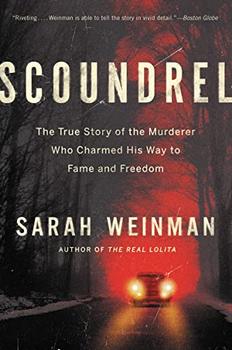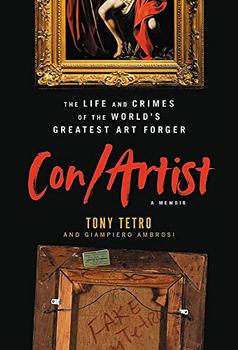Summary | Excerpt | Reviews | Beyond the book | Read-Alikes | Genres & Themes | Author Bio

Why We Fall for It ... Every Time
by Maria KonnikovaThere are two types of people who should read The Confidence Game: 1) those who believe they are far too savvy to ever fall for a con job, and 2) those who have found themselves the victim of a con artist.
Here's news for the first group: you're not just a little wrong, you're completely wrong. In fact, according to the voluminous research cited by the author, it's frequently the people who are most confident that they can't be conned who make the best targets. As for the second group, take heart: it's not your fault. Every human being is hardwired to be susceptible to the con. The instinct that compels us to trust the con artist is the same that's allowed us to form social bonds that have ensured our survival as a species. To sum up, whether you're in Group 1 or Group 2, the verdict is pretty much the same: you're screwed.
"When it comes to the con, everyone is a potential victim. Despite our deep certainty in our own immunity – or rather, because of it – we all fall for it." This is the thesis of Konnikova's fascinating and occasionally frustrating book, subtitled Why We Fall for It…Every Time. The 300-plus pages of case studies, sociological research, police reports, and first-hand testimony from both victims and con artists would certainly seem to support such an over-determined thesis. Most readers will, I suspect, shed some of their hubris about their own sense of invulnerability when they meet people just like them – highly educated, well-traveled, sophisticated – who have fallen for everything from three-card monte games (a quick and easy con involving the rapid re-arrangement of three playing cards) and emotionally manipulative fortune tellers to financial ponzi schemes and identity theft.
The disheartening thing about these true tales of people done in by fraud and con artists (from the "Nigerian Prince" Internet plea for funds to the "I lost my wallet and need bus fare to get home" ruse) is that often the victim's own obvious intelligence provided no natural defense against the smooth-talking grifter. "The smarter you are, the more likely you are to trust," Konnikova notes, citing a 2014 study by two Oxford psychologists. And trust is the key, the hook, that con artists use. "We are predisposed to trust. Those who trust more do better. And those who trust more become the ideal, albeit unwitting, player of the confidence game: the perfect mark."
Konnikova has unearthed a small mountain of research that appears to corroborate our collective culpability in the con, but all that wide-ranging material, rather than make a convincing case, tends to muddy the waters. For instance, she's found studies to demonstrate that what makes people susceptible to conning is simple fear. If you are afraid, your judgment is impaired and you'll make rash, uninformed decisions. She's found research to support that conclusion. Sounds reasonable, right?
But wait – what really makes people vulnerable to the con artist is sorrow – when we're emotionally distraught, our resistance is lower and we tend to agree more easily. Konnikova provides lots of research to support that theory. No wait, it's change that makes us more vulnerable (Lots of research? Check.) No, it's over-confidence (again, check). No wait, it's our love of "story" that makes us most vulnerable. Hold on, now it's hunger. Or tiredness. Or worrying about our health. Or needing to pee (not kidding – there's research to support that conclusion). After a while, I stopped trying to keep track of all the things that Konnikova argues put us at the highest risk for being conned. The author has impressively amassed study after study that testify to our vulnerability to cons because of dozens of reasons. But because there are so many different things we need to guard against, I gave up trying to remember what not to do to make myself vulnerable. Generally, whatever emotion you might be feeling from the time you wake up until you go to bed makes you, under the right circumstances, an easy mark, according to the book.
Much more compelling is Konnikova's dissection of the ten steps of every typical con job, with each chapter dedicated to one aspect, such as the put-up ("Size someone up well and you can sell them anything. A magic crystal. An Egyptian curse. The Eiffel Tower."), the play ("The play begins with that oldest of human endeavors, a dashing good yarn. Story is the quickest path to emotion."), the rope ("The Rope makes sure he bites and the hook sinks deep.") the breakdown ("…the moment when the con artist sees just how far he can take us."), etc. Konnikova mesmerizingly pulls back the curtain on the confidence game from the perspective of the grifter, sizing up the mark, laying down an emotional tale, moving in for the kill, and then taking anything and everything the mark is willing to provide (and in the case of some con artists, like financier-swindler Bernie Madoff, that could mean millions of dollars).
Reading The Confidence Game might not make you immune to all scams and schemes, but it can at least offer you consolation if you ever find yourself wondering how a smart person such as yourself could have ever been so foolish.
![]() This review was originally published in The BookBrowse Review in February 2016, and has been updated for the
January 2017 edition.
Click here to go to this issue.
This review was originally published in The BookBrowse Review in February 2016, and has been updated for the
January 2017 edition.
Click here to go to this issue.

If you liked The Confidence Game, try these:

by Sarah Weinman
Published 2023
From the author of The Real Lolita and editor of Unspeakable Acts, the astonishing story of a murderer who conned the people around him - including conservative thinker William F. Buckley - into helping set him free

by Tony Tetro, Giampiero Ambrosi
Published 2022
The world's most renowned art forger reveals the secrets behind his decades of painting like the masters - exposing an art world that is far more corrupt than we ever knew while providing an art history lesson wrapped in sex, drugs, and Caravaggio.
Your guide toexceptional books
BookBrowse seeks out and recommends the best in contemporary fiction and nonfiction—books that not only engage and entertain but also deepen our understanding of ourselves and the world around us.